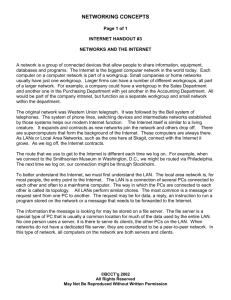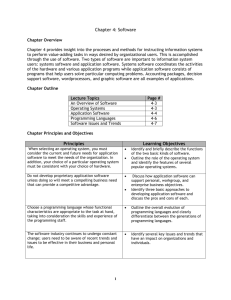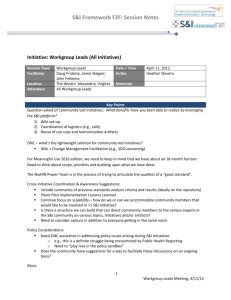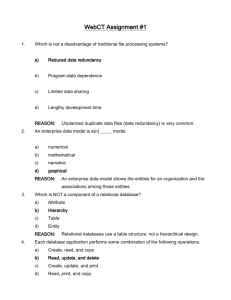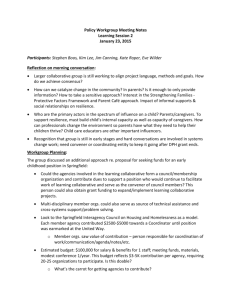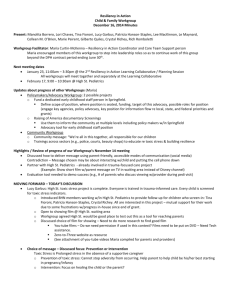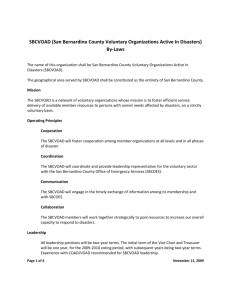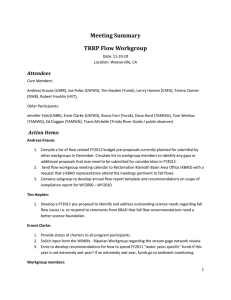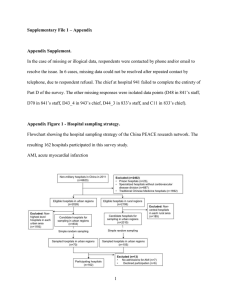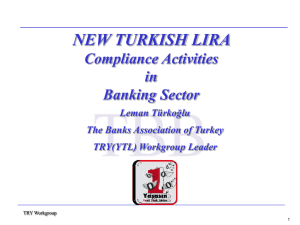October 2, 2012 - Connecticut Early Childhood Cabinet
advertisement
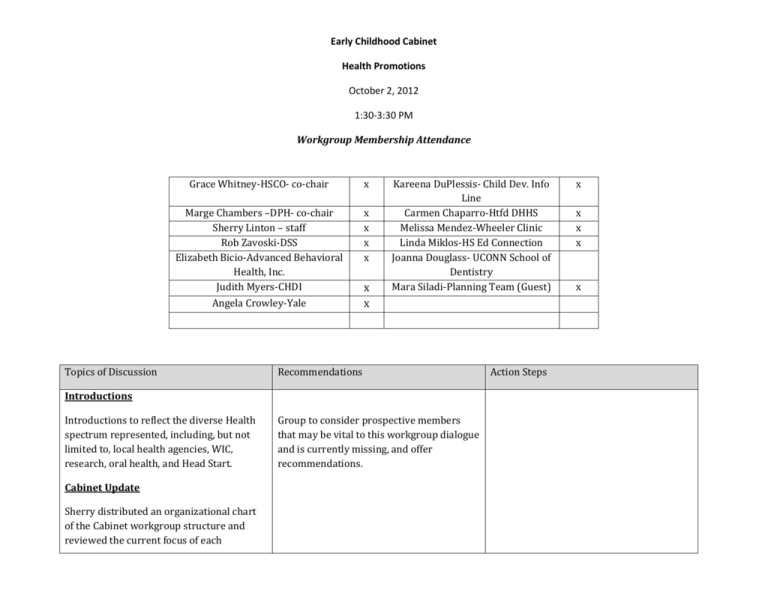
Early Childhood Cabinet Health Promotions October 2, 2012 1:30-3:30 PM Workgroup Membership Attendance Grace Whitney-HSCO- co-chair x Marge Chambers –DPH- co-chair Sherry Linton – staff Rob Zavoski-DSS Elizabeth Bicio-Advanced Behavioral Health, Inc. Judith Myers-CHDI Angela Crowley-Yale x x x x Topics of Discussion x x Kareena DuPlessis- Child Dev. Info Line Carmen Chaparro-Htfd DHHS Melissa Mendez-Wheeler Clinic Linda Miklos-HS Ed Connection Joanna Douglass- UCONN School of Dentistry Mara Siladi-Planning Team (Guest) Recommendations Introductions Introductions to reflect the diverse Health spectrum represented, including, but not limited to, local health agencies, WIC, research, oral health, and Head Start. Cabinet Update Sherry distributed an organizational chart of the Cabinet workgroup structure and reviewed the current focus of each Group to consider prospective members that may be vital to this workgroup dialogue and is currently missing, and offer recommendations. Action Steps x x x x x workgroup. Charge to Committee A Charge to Committee document was distributed to the group, with the stipulation that the group’s purpose and primary responsibilities will be determined by the group, with guidance from the cochairs. The group was encouraged to consider the Roles and Responsibilities currently listed as guidance taken from the recent Race to the Top-Early Learning Challenge (RTT-ELC) application process. In response to the Statement of Purpose discussion, key areas of focus were identified as relevant to the work of this group: Health disparities, Access (eligibility criteria),and The need to break down the misconceptions of policy barriers. The pending white paper for the upcoming First 1000 Days, Part 2 event was identified as a possible resource. Sherry reviewed the Decision Making process to be administered by the workgroups to ensure effective communication between workgroups and the overall Cabinet. Workgroup was also informed of the attributes and criteria that are considered when determining membership to the group. (See Charge to Committee document) Workgroups are encouraged to reach consensus on an issue and then offer that decision as a recommendation to the Cabinet for final approval. Review of Resources The Logic Model from the Health Promotions section of the RTT-ELC was distributed and reviewed, with special attention to the Goals, Activities and The goals and activities for Health Promotions that were identified in the RTTELC application could serve to inform the Deliverables. Grace also shared additional resources including, a recent CHDI report that offers 10 recommendations to systematically address children’s health and safety. Clarification made on the variations of HV models, with the commonality being that they all support children before prior to them entering school. work plan of this workgroup. The current MIECHV Home Visitation grants to communities to expand evidence-based home visiting models in high need communities were identified as opportunities to link our work. Aligning the focus of this workgroup with that work offers the opportunity to expand developmental surveillance. The clarification was made that the focus of this workgroup is on all children, not only those in public school settings or publicly funded preschool settings, such as School Readiness. Work Plan Discussion Prior to the discussion of developing the work plan, the workgroup members shared on the initiatives in which they are currently engaged, with consideration to be given to how those affiliations could inform the plans of the workgroup. Carmen Chaparro, City of Hartford Department of Health & Human Services Maternal Child Health Division, WIC and Pregnancy Prevention are areas of focus; Oversight of Health Equity Grant, supported by Kellogg Foundation; Social determinants constructs and the impact on learning. Angela Crowley, Yale School of Nursing Pediatric primary care with focus on underserved children, Electronic records to facilitate care coordination, Focused on the role of Health Centers, Involved in licensing study, multidisciplinary team, health consulting to family child care providers; Participant in national standards work. Marjorie Chambers, DPH, WIC Provides nutritional education and counseling; Conducts outreach , with focus on first trimester enrollment; Conducts breastfeeding promotion; Maintains anemia rate data of participants; Conducts focus groups. Grace Whitney, Head Start Collaboration Office Focus on the whole child; Connects people with opportunities for collaboration; Provides multi-disciplinary health consultation. Judith Myers, Child Health & Development Institute of CT Educates practitioners in the community; Focus on pediatric, mental health, and early childhood ; Special interest areas include Medicaid, medical homes, universal developmental screenings, and standard outcomes; Funds 39 Discovery Communities to ensure inclusion of Health, with technical assistance, in community plans; Focused on the utility of child health assessment data. Liz Bicio, Advanced Behavioral Health, Inc. Utilizes electronic medical health records for mental health services; Links families to Early Childhood Consultation services; Operates with funding that is unrestricted to a specific setting— statewide; Any child B-6 with social emotional needs can receive services; Weaves services into existing systems of services in any given community. Kareena DuPlessis, Child Development Infoline Offers a single point of entry for Birth to Three Services; Conducts child development monitoring through the Ages and Stages Questionnaire (ASQ); Links families to existing services; Participates on a care coordination collaborative in Hartford; Participates in a medical home pilot for children with special healthcare needs; Access point for early identification tool, “Learning the Signs;” Help me grow consultant and offers EPIC trainings on universal screen. Mara Siladi, ECE Planning Team Mara provided a planning Team update and informed the workgroup that they are still conducting listening Tours in communities. Rob Zavoski, DSS Husky Medical Director Provides services to ¼ of the children in the state; Goal is to have all clients of Medicaid in medical homes. Provides services to 1/5 of the adults in the state; Connecticut offers a range of services; primary care needs to be not through emergency rooms. 600,000 participants; Supports medical homes; Participates in the CT Identification Measurement/Health Disparities program; Acknowledges challenge of the complex needs of clients; For every dollar spent on children, $9 are spent on adults; Acknowledges data challenge for cost benefit analysis because different providers are paid differently for different services. Melissa Mendez, Wheeler Clinic Partners with Human Resource Agency (HRA) of New Britain to implement services to underserved children; There is a need for improved communication between dentists and obstetricians. Implements community-based strategies through federal funding of Project Launch; 117 trained in ASQ developmental screening instrument. Participates in cohort 2 of ChildFirst statewide expansion and Nurturing Families Expansion; Focused on infant mental health competencies and coordination of services to those hard to reach children and families, not typically in the system. Linda Miklos, Education Connection Head Start Provides health education, including oral health. Utilizes Cavity Free Kids Curriculum and I Am Moving I am Learning Curriculum for oral health and prevent overweight and obesity. Focused on communicating the message of how good health assures school readiness. It is imperative to preserve the work we have done on health.
